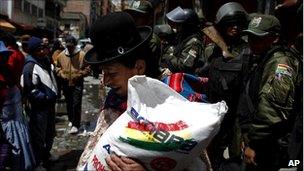Bolivia's Morales drops planned fuel prices hike
- Published

Bolivia's army had begun selling bread in response to a strike by bakers
Bolivian President Evo Morales has rescinded a decree which raised fuel prices by more than 70% and sparked civil unrest.
Mr Morales reversed the price rises introduced less than a week ago following talks with trades unions and groups representing indigenous peoples.
The fuel price hike had provoked mass protests and a transport strike.
Bolivia's army had begun selling bread in response to a strike by bakers angry at the move.
The leftist government said the aim was to prevent shortages and counter a threat by bakers to raise the cost of Bolivia's daily bread.
Bread price doubling?
In a televised message broadcast late on New Year's Eve, Mr Morales said he had listened to unions and social groups.
He would "obey what the people say by abrogating the decree raising gasoline and everything that accompanied that measure", the Associated Press news agency reported him as saying.
"That means that all of the measures are withdrawn."
The government withdrew heavy subsidies for petrol and diesel last Sunday, saying it could no longer afford to maintain a six-year price freeze.
It said much of Bolivia's oil was being smuggled out of the country by profiteers.
Petrol prices immediately went up by more than 70%, and diesel by more than 80%.
Transport workers had begun an indefinite strike against the price rises.
In an effort to lessen the impact of the bakers' strike, loaves baked in army ovens were being sold by troops in La Paz and El Alto.
"We have been baking bread in our barracks, where we have industrial ovens with a capacity for 10,000 loaves a day," a Bolivian army officer told local media.
The small loaves were being sold at the usual price of 0.40 Pesos Bolivianos (about 5 US cents or 3p), half what commercial bakers said they intended to charge when they reopened.
Mr Morales had also accused the bread makers of "taking advantage" of the situation by seeking to double the price of a loaf of bread, noting that the price of electricity and natural gas used in ovens had not gone up.
Political test
On Thursday there had been violent protests in the political capital, La Paz, as well as the neighbouring city of El Alto and in Cochabamba in central Bolivia.
Protests have been suspended for the New Year's weekend but were expected to resume on Monday, when the main trades unions were planning to march.
President Morales had announced a series of measures to counteract the impact of the fuel hike on Bolivia's mostly poor population.
Public sector pay and the minimum wage were being increased by 20%, he said. Power, phone and water tariffs were being frozen, and there was to be new assistance for farmers.
The fuel price hike - which protesters were calling the "gasolinazo" - caused the cost of transport to soar, and pushed all food prices up.
Correspondents say the protests are turning into one of the biggest political tests Mr Morales has had to face since he became Bolivia's first indigenous president in 2005.
Both his predecessors were forced from office by mass protest movements in which he, as a radical peasant leader, played a prominent role.
- Published31 December 2010
- Published27 December 2010
- Published27 December 2010